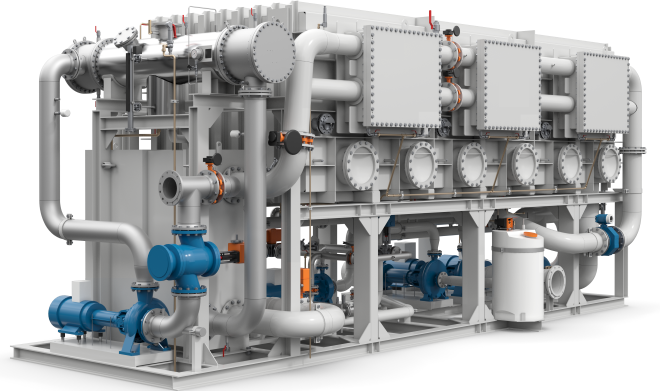MSF - Multi Stage Flash Distillation
Multi-Stage Flash (MSF) distillation is a thermal desalination process used to convert seawater into freshwater by harnessing the principle of evaporation and condensation. It is one of the oldest and most widely use methods of large-scale seawater desalination.
Process Steps
Evaporation: Seawater is heate in multiple stages or chambers under reduce pressure. Each stage operates at progressively lower pressure, usually achieve through a series of vacuum pumps. As the water enters each stage, it undergoes flash evaporation, where a portion of it vaporizes due to the reduce pressure and heat. The remaining brine becomes increasingly concentrate with dissolve salts.
Condensation: The vapor produce in the evaporation stage passes through a series of condenser tubes or heat exchangers. These tubes are typically arrange in a cascading fashion, with cool seawater flowing on the outside of the tubes. As the vapor comes into contact with the cool surfaces of the tubes, it condenses back into liquid form, known as distillate or freshwater.
Brine Disposal: The concentrate brine, which remains after the evaporation process, is collecte and discharge back into the sea or dispose of in an environmentally responsible manner.
Heat Recovery: MSF systems often incorporate heat recovery mechanisms to optimize energy efficiency. The rejecte heat from the condenser tubes can be utilize to preheat the seawater entering the system, reducing the overall energy requirements.
The MSF process relies on the temperature and pressure differences between the evaporation stages to drive the distillation process. It takes advantage of the fact that water has a lower boiling point under reduce pressure. The repeate stages of evaporation and condensation allow for the efficient removal of salts and impurities from seawater, resulting in the production of freshwater.





